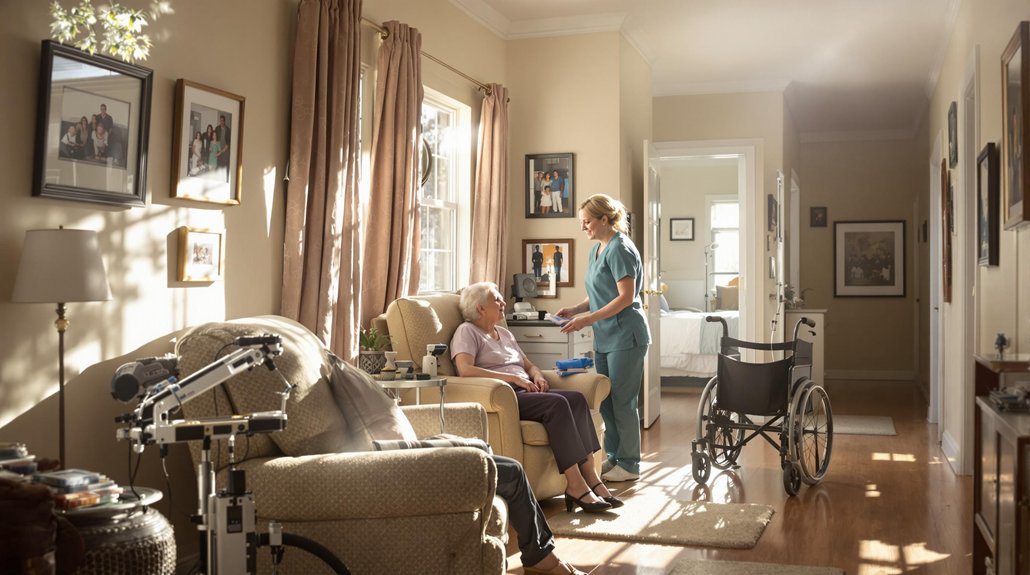Home care and personal care offer different types of assistance when you’re aging in place. Home care providers have medical training and can perform skilled nursing tasks, physical therapy, and medical monitoring. Personal care assistants focus on non-medical support like helping you with bathing, dressing, meals, and daily activities. You’ll find home care costs more and often requires insurance coverage, while personal care is more affordable but typically isn’t covered. Understanding these key distinctions will help you make the right choice for your situation.
Defining Home Care Services and Their Scope
Support with daily living activities forms the foundation of home care services. When you provide home care, you’ll help clients maintain their independence while living safely in their own residences. Your services can range from basic household assistance to more extensive care coordination.
Home care encompasses various service types that make daily life more manageable for your clients. You’ll handle tasks like meal preparation, light housekeeping, laundry, and medication reminders.
Additionally, you might assist with transportation to appointments, grocery shopping, and running essential errands. As a home care provider, you’ll also offer companionship and emotional support, helping to prevent isolation and maintain your client’s social connections.
Understanding these service components allows you to deliver thorough care that truly enhances your clients’ quality of life. Working with skilled caregivers ensures clients receive personalized care plans that address both their health and social needs while maintaining the highest standards of home care.
Understanding Personal Care Assistance
While home care focuses on daily living assistance, personal care involves more intimate and hands-on support with physical needs. You’ll find that personal care includes direct physical contact and support with activities like bathing, dressing, grooming, and toileting. These assistance types require a higher level of trust and specialized training.
Personal care providers help maintain your loved one’s dignity while assisting with sensitive daily tasks. They’re trained to transfer clients safely, monitor skin conditions, and assist with mobility.
You can count on them to help with oral hygiene, hair care, and other personal grooming needs that require close physical contact. When you’re considering care options, remember that personal care services often require certification and specific qualifications to guarantee proper support and safety protocols are followed. Dementia-certified caregivers provide additional expertise for those with cognitive decline and memory care needs.
Key Differences in Qualifications and Training
The qualifications required for home care and personal care providers differ considerably in both scope and intensity. When you’re exploring these career paths, you’ll find distinct training requirements and qualifications overview for each role.
| Aspect | Home Care | Personal Care |
|---|---|---|
| Education | Medical degree/nursing | High school diploma |
| Certification | State license required | Basic certification |
| Clinical Hours | 1000+ supervised hours | 40-60 training hours |
| Specialization | Medical procedures | ADL assistance |
| Continuing Ed | Annual requirements | Optional workshops |
Home care providers need extensive medical training and must maintain state licensure, while personal care assistants focus on non-medical support requiring basic certification. You’ll find home care demands clinical expertise in medical procedures, whereas personal care emphasizes practical skills in daily living assistance. Both roles serve essential purposes but require different levels of professional preparation. Skilled nursing care includes specialized medical services like wound care and medication management that personal care providers are not qualified to perform.
Cost Considerations and Insurance Coverage
Understanding cost differences between home care and personal care services requires careful consideration of insurance coverage options.
Making sense of care costs means closely examining how different insurance plans cover home-based versus personal assistance services.
When performing a cost analysis, you’ll find that home care typically commands higher rates due to medical expertise and specialized equipment requirements. Most health insurance policies and Medicare will cover home care when prescribed by a physician, while personal care usually isn’t covered.
You’ll need to weigh out-of-pocket expenses carefully. Personal care services generally cost less per hour but may require more hours of coverage.
If you’re exploring long-term care insurance, check whether your policy covers both types of care. Some policies offer extensive coverage for both medical and non-medical services, while others strictly limit coverage to skilled nursing care.
Compare multiple providers to verify you’re getting the most value for your care needs.
Medicaid home health services can provide a cost-effective alternative for eligible individuals meeting specific income and medical criteria.
Choosing the Right Care Option for Your Needs
Selecting between home care and personal care requires a thorough assessment of your unique situation and medical requirements.
Start by evaluating needs like mobility, medical conditions, and daily living activities. Consider whether you need specialized medical care or primarily assistance with basic tasks.
When choosing caregivers, think about the level of medical expertise required. Home care might be your best option if you need skilled nursing, physical therapy, or medical monitoring.
If you mainly need help with bathing, dressing, or meal preparation, personal care could be more appropriate.
Don’t forget to factor in your living environment, family support system, and long-term goals.
You’ll want to select care that not only meets your current needs but can also adapt as your situation changes over time.
At Focus Family Care, our experienced caregivers can help determine the most appropriate level of care through a free consultation.
Conclusion
Understanding the difference between home care and personal care is like picking the right tool for the job. Home care covers many needs, including medical help and daily support, while personal care helps with basic daily tasks like bathing and getting dressed. Think of home care as having a helper who can do many different things, while personal care is like having someone focused on helping you feel clean and comfortable each day.
Remember, you don’t have to figure this out alone. Many families face these same choices, and there’s always someone ready to help you make the best decision for your situation. Our caring team at Focus Family Care understands how important it is to find the right kind of support for you or your loved one.
If you or a loved one need help, don’t wait. Reach out to Focus Family Care today at (561) 693-1311 or email us at info@focusfamilycare.com.




